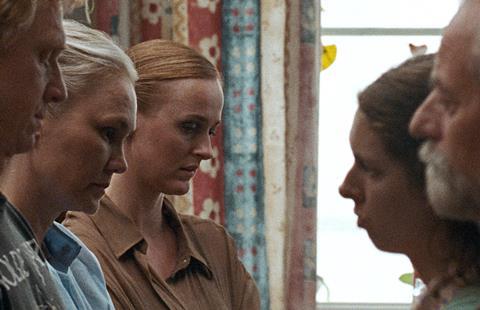A schoolboy’s accusation is the catalyst for this Norway-set Un Certain Regard standout starring Renate Reinsve

Dir. Halfdan Ullmann Tøndel. Norway/Netherlands/Sweden/Germany 2024. 117mins
A murky incident between two young boys becomes a long dark schoolday of the soul in Armand, an intense, troubling and confidently executed debut feature from Norwegian writer-director Halfdan Ullmann Tøndel. He is the grandson of Scandinavian cinema royalty, Liv Ullmann and Ingmar Bergman, so it is perhaps to be expected that some of the family tradition of fearless cinematic soul-exploring has rubbed off on him; that apart, Ullmann Tøndel proves that he has his own individual voice in a film that sweeps from microdrama concentration to ferociously expressionistic intensity.
Resonant and haunting
This Un Certain Regard standout boasts gripping stylistic and dramatic control, together with superb ensemble acting from a cast including Renate Reinsve, who won the Best Actress award in Cannes for 2021’s The Worst Person in the World. All this, and Reinsve’s ever-rising profile after Sundance hit A Different Man, should put this challenging but satisfying film on the map internationally for niche audiences willing to have their souls expertly worked over.
As the film begins, a young woman, Elisabeth (Reinsve) is driving furiously through a forest. She has been called to a meeting at the primary school of her son Armand – a dark, cavernous, château of a building, at least as photographed in ominous half-light by DoP Pål Ulvik Rokseth. The meeting concerns allegations made by a 6-year-old boy, Jon, that classmate Armand has abused him sexually.
Inexperienced young teacher Sunna (Thea Lambrechts Vaulen) is put in the hot seat by colleague Asja (Vera Veljovic) and aging, ineffectual school head Jarle (Øysten Røger), who leave her on her own to oversee the confrontation between Elisabeth and Jon’s parents Sarah and Anders (Ellen Dorrit Petersen, Endre Hellestve). Eventually, Asja and Jarle have to sit in, and the direct discussion of a deeply serious matter continues to be deferred, both when Asja develops a nosebleed (seen in comic extreme close-up) and when Elisabeth bursts helplessly (or deliberately, as Sarah suspects) into an extended bursts of nervous, or contemptuous laughter.
Gradually, more information emerges about the people we see in this claustrophobic setting: Sarah was once the best friend of actress Elisabeth, and the sister of Elisabeth’s husband Thomas, now dead, while both Sarah and Thomas are ex-pupils of the school. The more we learn, the more the setting, and the style, of the film open up in disconcerting ways. People appear in key scenes who may not literally be present, while Elisabeth has two out-of-the-blue dance sequences – one a solo purging of her angst which turns into a pas de deux with the school cleaner (Patrice Demonière), the other a semi-orgiastic, semi-violent group routine.
Armand is a film that registers on every level: it begins as contained chamber piece with comic touches, suggesting a terse variation on the tropes of courtroom investigative drama. But the film’s more abstract, poetic registers become evident early on, whether in Mats Lid Støten’s sound design (the creak of Elisabeth’s oilcloth coat, an insistent faulty fire alarm, rhythmic footsteps); camera effects that stretch a corridor elastically; or the refrigerator-like blue light that steeps into two moment-of-truth discussions between Sarah and Anders. A child’s red outfit hanging in a corridor also has a subtly unnerving effect, but it remains one of those oblique mysteries that suffuse the film, right up to a ferocious rain-soaked finale and Reinsve’s enigmatic sign-off.
The film starts by promising a bourgeois social drama about secrets and lies, suspicions and rivalries, and the troubled waters of juvenile and adult sexuality. What it ultimately becomes is much harder to define, but the result is resonant and haunting – and should spark plenty of post-screening discussions. Reinsve stands out at the centre of a superb ensemble cast as a character defined by unknowability and an ever-shifting surface – contemptuously brittle one moment, the next melting before our eyes.
Production company: Eye Eye Pictures
International sales: Charades sales@charades.eu
Producer: Andrea Berentsen Ottmar
Cinematography: Pål Ulvik Rokseth
Production design: Mirjam Veske
Editor: Robert Krantz
Music: Ella Van Der Woude
Main cast: Renate Reinsve, Ellen Dorrit Petersen, Endre Hellestveit, Thea Lambrechts Vaulen
























